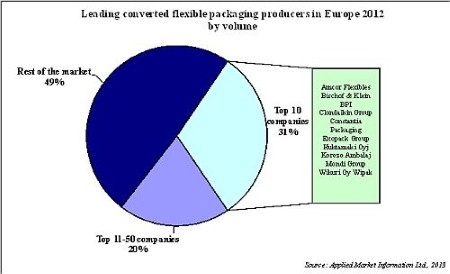
This valuation may surprise some industry observers as considerably lower figures have more typically been given for the converted flexible packaging industry in Europe. However, from an analysis of the 50 companies profiled in this report AMI believes these figures to be under-estimated.
The converted flexible packaging industry covers flexible packaging materials which have undergone some kind of converting process such as printing, lamination, coating, extrusion lamination and coating and/or sack-, bag- or pouch-making. It involves the use of a wide variety of substrates including plastic films, paper and foil that can be used in various weights gauges and widths and in various combinations.
Given the complexity of materials and combinations that can be used and the variety of converting processes that may be applied, the industry involves a wide range of companies and business models. Traditionally the industry has been highly fragmented but a number of major regional and global groups have emerged in Europe to meet the needs of the global brand owners. Rising costs, growing environmental concerns and the economic downturn have placed increased pressure on all players and this continues to drive corporate restructuring and strategic change among them. There is a greater emphasis on the emerging markets of Eastern Europe and Russia along with moves to shift production to higher value products within West European operations or close them altogether.
Sun Capital Partners, Inc.’s decision to merge its portfolio companies, the US-based Exopack with the European-based Britton Group, PACCOR, Kobusch and Paragon Print & Packaging mid 2013 is the most recent and largest of these corporate changes. It makes it the sixth largest packaging company in the world but it remains to be seen whether this will result in further restructuring in the form of closures or divestments.
As these leading European flexible packaging converters evolve and change, an understanding of their strategy and future direction is critical for all companies involved in the business. This report aims to provide some of the answers by analysing the background, development and strategy for 50 of the largest flexible packaging converters in Europe. In undertaking this analysis we have attempted to select the 50 groups profiled here on the basis of the value of their respective European converted flexible packaging sales for 2012.







